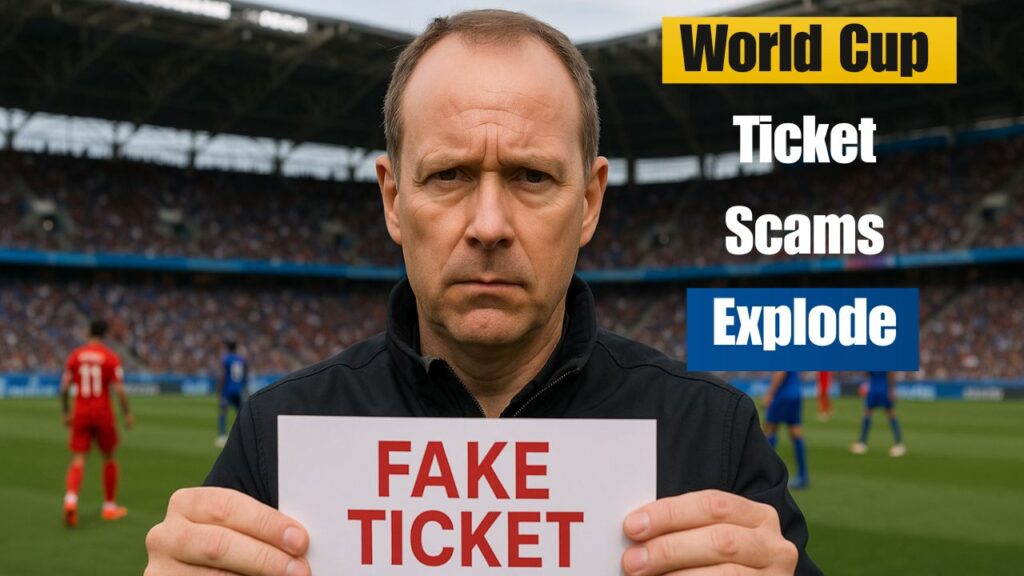The FIFA World Cup excitement has barely begun, but a new warning has left football fans across the United States and beyond on high alert. Thousands of supporters have already fallen victim to fake ticket scams, losing hundreds and even thousands of dollars to fraudulent websites and social media sellers. According to FIFA, scammers are exploiting fan enthusiasm by creating websites that mimic the official ticketing portal. With demand for tickets surging, the governing body has urged fans to verify purchases through official channels only and stay vigilant against too-good-to-be-true offers.

FIFA Issues Global Alert Against Fake Ticket Sellers
In a recent statement, FIFA officials confirmed a growing number of reports involving fans who paid for non-existent tickets ahead of the upcoming World Cup 2026. These scams often use authentic-looking URLs, social media ads, and emails that appear official. Victims report that after sending payments, scammers disappear or issue counterfeit e-tickets that are invalid at stadium gates. FIFA emphasized that the official ticketing portal remains the only verified source for purchases. Authorities in countries like the United States, Mexico, and Canada are now working with cybersecurity units to track down these fraudulent operations before more fans are deceived.
How Scammers Target Football Fans Worldwide
Cybercriminals have become more sophisticated in their approach, using fake countdowns, early-bird offers, and limited-seat alerts to create a sense of urgency. These ticket fraud networks often advertise on social media platforms like Facebook and X (formerly Twitter), posing as verified sellers. Experts say they also use hacked accounts and AI-generated emails to look legitimate. Fans are advised to check the website domain carefully and avoid sharing personal payment details through messages or DMs. Law enforcement agencies are currently monitoring online ticket sales trends to prevent further losses, warning fans that if a deal seems too good to be true, it probably is.
FIFA’s Official Recommendations to Stay Safe
To protect supporters, FIFA has outlined a list of essential safety tips. Fans should buy tickets only from the FIFA.com portal and verify confirmation emails that end with official domains. It’s also recommended to avoid reselling platforms or third-party groups on social media. Those who have already been scammed should immediately report the case to local cybercrime authorities and their banks. FIFA is reportedly planning a dedicated awareness campaign ahead of the tournament to educate the public about ticket security checks and digital verification systems that will be used during stadium entry.
Breakdown of Reported Fake Ticket Incidents
Recent statistics reveal that thousands of fans across North America have been impacted by ticket purchase fraud. Below is an overview of affected regions and estimated losses compiled from recent FIFA and police reports.
| Country | Estimated Victims | Average Loss (USD) | Main Scam Method |
|---|---|---|---|
| United States | 2,400+ | $650 | Fake ticketing sites |
| Mexico | 1,800+ | $420 | WhatsApp & social media |
| Canada | 1,200+ | $510 | Phishing emails |
| UK | 900+ | $580 | Resale marketplaces |
FAQ 1: How can fans verify genuine tickets?
Only purchase from the FIFA.com official portal and confirm your email receipt from an official domain.
FAQ 2: What should victims of scams do?
Report immediately to your bank and local cybercrime unit for investigation and potential recovery.
FAQ 3: Are resale tickets valid for entry?
No, tickets bought from unauthorized sellers or reselling platforms are invalid for entry.
FAQ 4: How to identify fake ticket sites?
Check for spelling errors, unofficial URLs, and lack of secure payment options before proceeding.





